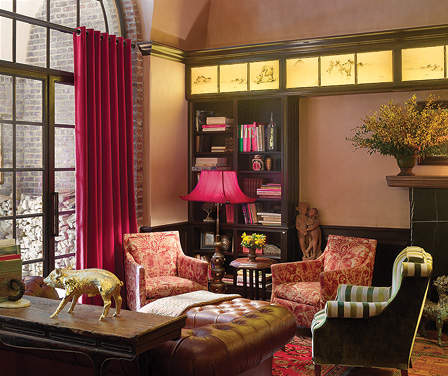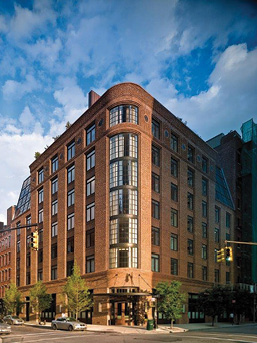- Home
- Media Kit
- Current Issue
- Past Issues
- Ad Specs-Submission
- Ad Print Settings
- Reprints (PDF)
- Photo Specifications (PDF)
- Contact Us


![]()
ONLINE

The Personal Touch
Editors’ Note
Born in Colombo, Sri Lanka, Philip Truelove began his career as Reception Manager at the Ritz Hotel in London in 1970. He later held managerial positions with the Connaught Hotel, The Ritz-Carlton in Washington, D.C., Chateau Marmont, and The Mercer Hotel. He owned and operated The Island Inn in Monhegan, Maine. Truelove received his M.B.A. in Hotel Administration in the U.K.
Property Brief
The Greenwich Hotel (thegreenwichhotel.com), located in New York’s Tribeca district, has 88 rooms and suites with furnishings from hand-loomed, Tibetan silk rugs to English leather settees. All beds are Duxiana and bathrooms are designed in unique patterns of hand-laid Moroccan tile or Italian Carrara marble. Modern room features include high-definition flat-screen TVs, iPod docking stations and complimentary wireless Internet. Hotel features include a drawing room and courtyard, Locanda Verde restaurant, Shibui Spa, as well as indoor pool and gym facilities. The Greenwich Hotel is a member of The Leading Hotels of the World.

The Grenwich Hotel drawing room
Where do you see the New York City hospitality market today and has this been a growth year for the property?
It has been a growth year – New York is a very resilient market. In fact, occupancy is surging even though there are so many new hotels. Throughout recent history, additional hotel rooms in such numbers usually cause a slight decrease in occupancy but, at this point, everyone is doing well which is a very positive sign, and I don’t think there is any reason for it to change.
Is The Greenwich Hotel’s competitive set location based or do you look across the city?
We do look across the city. We have to consider our neighbors in Lower Manhattan, which are direct competitors, but we also look at Midtown where the five-star hotels traditionally have been and continue to be.
We have two primary competitive sets as a result – those nearer neighbors and those hotels in Midtown. This gives us a better picture of occupancy, average rate and RevPAR.
Are you more focused on driving rate or occupancy for the property?
With us, it’s a balance of both. We don’t sacrifice rate to get occupancy. We certainly like to see an increase in occupancy, but it has to be at a similar or improved average rate. There is no benefit for us to have a high occupancy and a lower average rate.
Are you happy with the state of the property and are there changes on the horizon?
We’re very happy and we continually work to improve and update, and technology is one thing that we have to constantly review and monitor for the future.
The advance of technology is relentless and reflects the world we live in. We tend to look cautiously at new developments and sometimes have to laugh because so many people are calling us to say that we need robots. I’m not quite there yet; this is still frightening to me!

The Grenwich Hotel exterior
The Greenwich Hotel emphasizes the personal connection with guests. How critical is it to make sure that the focus on technology does not take away from the personal touch?
It’s essential. So much of the technology is about texting and messaging and allowing people to check in without going to the front desk and to ask questions without a face-to-face conversation. This truly takes away so many points of personal contact with the staff, who will be looking after them.
I’m very wary about taking away that personal contact. Much of our success is that so many of the staff have been here since the hotel opened and there should be a close connection between those who stay here and those who work here.
How important is it to have owners that continually invest in the property and have a long-term vision?
It’s incredibly important because, when we work toward the long-term, it’s so much more effective than taking short-term steps. This was evident to us when the hotel opened in 2008, which was a truly difficult time, and we agreed that we would look toward the long-term – we didn’t sacrifice rates or do anything drastic to gain business but just continued in a positive fashion.
We offered the service we planned to, in the manner that we intended to and, in the end, the results were exactly what we wished for.
You have found a successful partnership with the food and beverage part of the business. What is the secret to driving profit in this area?
We’re very lucky to be working with a very professional company that is so very good at what they do. As I was growing up, hotel restaurants were considered a necessary amenity and profit was not the driving factor. Now, one wants to provide an excellent dining experience, so to work with a company that is a professional in the field and that can provide that experience is a huge benefit for the guest and, as a company in its own right, it has to run a successful business which provides a profit.
The Greenwich Hotel has a strong spa offering. Is this an area where you drive profit or is it more of an amenity?
The main intention was, and is, to provide a great amenity for our guests. It certainly is a luxury for an 88-room hotel to have a swimming pool, a big gym and a spa. This has proved to be a huge asset for the hotel during what would otherwise be quieter times such as weekends and during holiday periods.
The spa is also a great asset for our neighbors and now has a very loyal following.
As time has passed, we have found that Shibui Spa has continued to be a great amenity for the guests and, at the same time, a profitable one.
How important is it for young people entering the hospitality business to take the time to learn all aspects of the business in order to build a sustainable career?
Unless one understands the business they’re running, and that can only be done by working through the various departments in the hotel, they won’t be effective as a leader. It’s easy to forget how much of a challenge it is to get the rooms clean, for example. One has to put oneself in the position of doing each of the jobs and therefore understand exactly what is involved.![]()